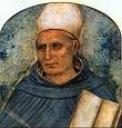Saint of the Day – St. Albert the Great
November 15 is the feast of St. Albert the Great (c 1206 – 1280), the German Dominican who not only taught St. Thomas Aquinas, but established the basic pattern for uniting faith and reason that became medieval scholasticism. According to Pope John Paul II, of all the doctors of the Church, St. Albert alone bears the title of “the Great.” In his address at Cologne on November 15, 1980, the seven hundredth anniversary of the saint’s death, Pope John Paul II, in his address on “Science and Faith in the Search for Truth,” beautifully summarized St. Albert the Great’s legacy and the current challenge for Christian scholars to confront a transformed world.
Not only did he shape philosophy and theology for centuries to come, St. Albert the Great, along with Roger Bacon, helped to lay the foundations for experimental science. He is still acclaimed in the history of botany, geography, chemistry, and physics. St. Albert the Great demonstrated the sphericity of the earth – a concept that had been lost with the fall of Greco-Roman civilization. He emphasized the importance of experiments in the study of the natural sciences. In fact, he gave us the distinction between the philosophical and natural sciences that we still use today.
Eleventh century Europe was a time of tremendous change. Towns and cities emerged to challenge the feudal order of the previous centuries. Trade and communication spread across Europe once again. The great mendicant orders – the Franciscans and the Dominicans – re-evangelized Europe and set up centers of learning.
Perhaps what is most interesting in St. Albert the Great was his ability to think critically and teach others how to do it as well. He did not accept the teaching of authorities, whether it was Plato, Aristotle, or St. Augustine, without a critical evaluation. St. Albert the Great did accept the broad boundaries of approved Christian teaching or orthodoxy. He also showed that reason and experimental inquiry were not incompatible with faith. St. Albert the Great acknowledged the transcendence of God and that we as humans could go only so far with our gift of reason and observation until we came to the threshold of revelation. He did not challenge the reality of miracles, but he was more interested in what could be learned from the natural order of things, which is the way God works most of the time.
Paradoxically, many legends developed in later centuries about St. Albert as a sorcerer and magician, which were recounted by such a great philosopher as Hegel. In one legend, St. Thomas Aquinas throws a punch at a talking machine that St. Albert has invented. Because of these accounts, St. Albert the Great has been adopted by the New Age movement.
Although St. Albert the Great was one of the greatest theologians, philosophers, and scientists of the Western tradition, he was also a Dominican provincial superior, bishop, diplomat, administrator, and spiritual director. He wrote the first Summa Theologiae and provided the model for a reasoned exposition and defense of the faith. As much as he was a man of faith, St. Albert the Great was a great believer in the importance of reason and observation.
For those of us who have grown up with the official Catholic Thomism of the 20th century, it can be hard to imagine how radical St. Albert the Great and St. Thomas Aquinas were for their time. The critical study of Christian, Islamic, Jewish and ancient non-Christian thinkers was based on the notion that truth can be found everywhere. As basic as this might seem to us, it caused a lot of controversy. St. Albert the Great was criticized for not devoting himself to scripture and theology. “How could God be subject to reason?” What we were to believe and think as Christians had all been laid out in the scriptures, the Church Fathers (and Mothers), and the official pronouncements of the Church. Yet, the exigencies of that time of great change required some way to deal with the re-introduction of knowledge, information, and technology that had been lost for centuries.
There is no doubt that St. Albert the Great would be fascinated with the social, technological, and theological challenges of the early 21st century. Do we have his same bold faith?
There is a wonderful page of resources and links about St. Albert the Great. It is well worth perusing. For a special treat listen to Austeritate Vitae the special chant for the feast of St. Albert.










